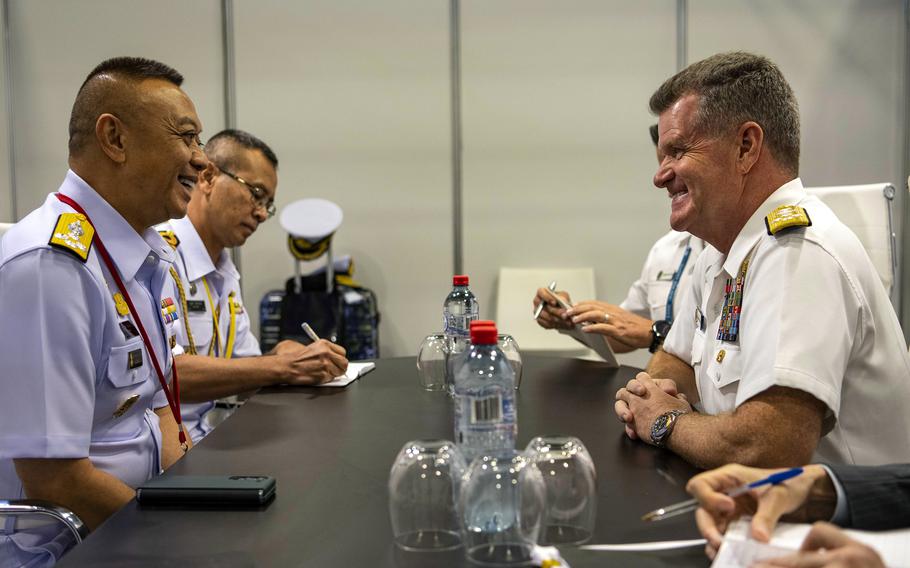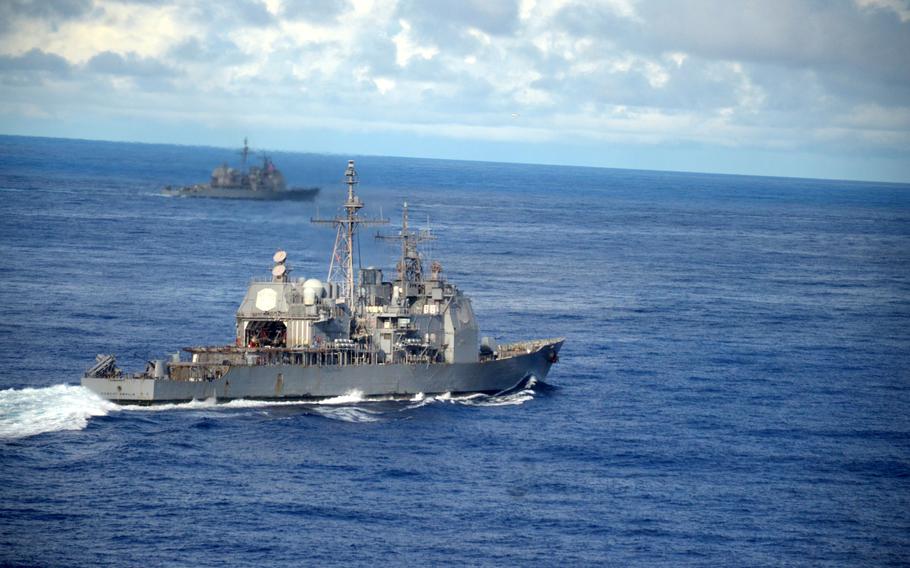
Adm. Samuel Paparo, right, commander of U.S. Pacific Fleet, meets with the head of the Thai navy, Adm. Adoong Pan-iam, during the Indo Pacific International Maritime Exposition in Sydney, Nov. 7, 2023. (Jeremy Boan/U.S. Navy)
Aggressive actions by China’s military and coast guard toward the U.S. and other nations in the Indo-Pacific have steadily increased over time to create “tense, uncomfortable situations,” the commander of U.S. Pacific Fleet has said.
Adm. Samuel Paparo, speaking to reporters Wednesday in Sydney, said Beijing has carried out about 180 aggressive or coercive military acts since he took command in fall 2021. The media roundtable was part of the 2023 Indo Pacific International Maritime Exposition.
“They are increasingly provocative and it’s deeply concerning,” Paparo said, according to a transcript provided to Stars and Stripes by Pacific Fleet. “At times, they’ve hazarded themselves, and they’ve hazarded the people that are in the vessels and aircraft they’ve interacted with.”
In one recent incident, a Chinese J-11 fighter jet executed an “unsafe intercept” of an Air Force B-52 Stratofortress bomber in international airspace over the South China Sea, U.S. Indo-Pacific Command announced Oct. 24.
The Chinese aircraft flew with “uncontrolled excessive speed” and maneuvered “below, in front of, and within 10 feet of the B-52, putting both aircraft in danger of collision,” according to a news release.
Paparo’s comments follow years of tension in the region between Washington and Beijing.
The U.S. over the past several years has repeatedly espoused a belief in a “free and open Indo-Pacific,” particularly regarding navigational and economic rights.

The guided-missile cruiser USS Robert Smalls sails in formation during a multi-carrier exercise in the Philippine Sea, Monday, Nov. 6, 2023. (Alex Wilson/Stars and Stripes)
China, which claims nearly the entire South China Sea as its territorial waters, views U.S. activity in the Indo-Pacific as counteractive to regional stability.
Paparo leads a force of more than 200 ships, 1,500 aircraft and 150,000 personnel. He said he believes Beijing is directing its pilots and sailors to “be more aggressive, and they have followed those orders.”
He pointed to China’s assertions of “unlawful claims with no basis in international law” as evidence of those orders, and said it wants to create difficult situations in the hope that the U.S. and its partners “will vacate the space that every force has a right to be.”
The U.S. does not reciprocate aggressive behavior in reversed situations, Paparo said. Chinese forces are “greeted with safe and professional behavior” from the U.S. when they operate near American waters close to Alaska or Guam, for example.
The three-day conference, which concluded Thursday, was one of numerous stops for Paparo in Australia. He also visited with numerous defense officials and counterparts, including high-ranking leaders from Japan, Thailand, Germany, Sri Lanka, Vietnam, Polynesia and New Zealand, according to a Thursday news release from Pacific Fleet.
From Thursday to Friday, Paparo visited Papua New Guinea to meet with defense officials there and to “affirm the longstanding partnership and bilateral relationship between Papua New Guinea and the United States,” Pacific Fleet said Friday in a news release.
This week, the Air Force is hosting the Pacific Air Chiefs Symposium 2023 at Joint Base Pearl Harbor-Hickam in Hawaii from Monday to Thursday to discuss “challenges and opportunities in and around the Indo-Pacific,” Pacific Air Forces said in a recent news release.
The symposium is expected to be the “largest ever” with more than 20 countries in attendance, and an “unprecedented” number of senior enlisted leaders participating, according to the release.